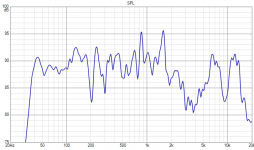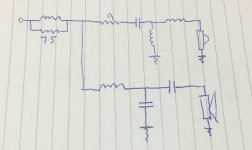So i bought these beautiful locally crafted 8" transmission line speakers. The company is now extinct sadly. (but i got them for an amazing price because of that.)
The cabinets are stunning and very inert. Made out of Plywood with a native real wood veneer.

Tweeter is a Dai-ichi DT-81 https://mega.nz/file/kQBQTDoS#qX3DtvMSzE9EnrmaVq-fWHBuMZocYfgWJGqBjSZi4M8
Mid - Response CW2192
Woffer - Response CW2196
Picture of the crossover for the mid and tweeter. Woofer just has a 9mH inductor in series.
https://mega.nz/file/sYQhWQRT#mv9-vGMiIxP4TJ5KTRLhibM3HcwISKbt7qlCMhEtpf8
Link to way-back machine achieve of Pure-sound websight.
https://web.archive.org/web/20160801014151/http://puresound.co.nz/?page_id=204
Unfortunately the High's somehow sound veiled, and also a bit fatiguing as well?
Because i got them for such good price, and the cabinets are so nice, i think upgrading them would be a good option.
Is this just a case of Finding a new tweeter that will physically fit, has a similar sensitivity, and desirable frequency response?
Any thought welcome.
Skyfire
The cabinets are stunning and very inert. Made out of Plywood with a native real wood veneer.

Tweeter is a Dai-ichi DT-81 https://mega.nz/file/kQBQTDoS#qX3DtvMSzE9EnrmaVq-fWHBuMZocYfgWJGqBjSZi4M8
Mid - Response CW2192
Woffer - Response CW2196
Picture of the crossover for the mid and tweeter. Woofer just has a 9mH inductor in series.
https://mega.nz/file/sYQhWQRT#mv9-vGMiIxP4TJ5KTRLhibM3HcwISKbt7qlCMhEtpf8
Link to way-back machine achieve of Pure-sound websight.
https://web.archive.org/web/20160801014151/http://puresound.co.nz/?page_id=204
Unfortunately the High's somehow sound veiled, and also a bit fatiguing as well?
Because i got them for such good price, and the cabinets are so nice, i think upgrading them would be a good option.
Is this just a case of Finding a new tweeter that will physically fit, has a similar sensitivity, and desirable frequency response?
Any thought welcome.
Skyfire
Last edited:
A crossover upgrade was defiantly on the cards as well. Thanks for the brand recommendation.If it were me, I would upgrade all 3 caps on the crossover first with ClarityCaps.
I did do some VERY crude frequency sweeps just using my phone and the Spectroid app. The Dai-ichi tweeter doesn't really strike me as great quality. very plastic, and average motor.I would measure the speakers to see what's wrong. Changing the tweeter would be low on my list of priorities as long as it doesn't turn out that it was an inappropriate choice for the job. The same goes for the capacitor brands.
The marketing material also goes on about a deflation circuit?
A diffraction circuit is also used in the SGM380. Diffraction occurs when frequencies which have a wavelength equal to or shorter than the width of the front baffle (usually 1KHz and above) diffract, thus boosting their loudness by 6 dB’s. This occurs in 99% of speakers which is why most speakers sound artificially bright when compared to live music. The circuit uses resistors and chokes to correct the diffraction, giving the speaker a far more transparent and natural sound.
Yellow is the noise floor (hot day, every fan going ), red is the peek. I'll have time tonight to do a better screen capture.
), red is the peek. I'll have time tonight to do a better screen capture.
Would just bypassing that final inductor on the tweeter circuit give me some more hi-end detail?
Thanks
 ), red is the peek. I'll have time tonight to do a better screen capture.
), red is the peek. I'll have time tonight to do a better screen capture.Would just bypassing that final inductor on the tweeter circuit give me some more hi-end detail?
Thanks
Last edited:
https://www.jaycar.com.au/woofer-speaker-driver-8-inch/p/CW2196
https://www.jaycar.com.au/woofer-midrange-speaker-driver-5-inch/p/CW2192
WWhat ar eteh box dimensions & interior configuration?
Dave
https://www.jaycar.com.au/woofer-midrange-speaker-driver-5-inch/p/CW2192
WWhat ar eteh box dimensions & interior configuration?
Dave
The outer dimensions of the box is 240mm x 240mm x 970mm that dosen't count the skirt/plinth. The tweeter and mid are in their own seald Enclose that's stuffed with poli-fill, so it's going to be a real challenge to give you an accurate volume.
18mm material? Where is the terminus? Any insde partitions? We can ignore the little box for the mid. I am more interested in the line length and cross-sections. J can work that out from dimensions once you get inside. And the driver offset (distance from either end will do).
dave
dave
Can someone check my work?

The small inductor is rolling the top of the tweeter. An awful lot of attenuationas well. No low pass on the mid.
dave
The small inductor is rolling the top of the tweeter. An awful lot of attenuationas well. No low pass on the mid.
dave
I did have it in a fifferent place, but that combo sits just before theProbably the 1.8mH-30 Ω cell coes to the mid...
🤔
Some of the connections are hard to make out and the shagows don’t help.
I expect the OP will need to go move some wires around and check to see what really hooks up to what.
The 0.05 fell into place at the end, it is strange,
dave
Last edited:
Parallel, not series. The inductor with the shunt R does not sit before the mid. The in goes to the ground input commin with the tweeter…. time to go juggle.
Here is a photo from the opposite angle.
https://mega.nz/file/JJwQXRSC#UMjYLyzy-3hXxPcfgreu6wHSucLp8noqnyszuIIxxHI
https://mega.nz/file/JJwQXRSC#UMjYLyzy-3hXxPcfgreu6wHSucLp8noqnyszuIIxxHI
6
The tweeter and the mid share an enclosure.18mm material? Where is the terminus? Any insde partitions? We can ignore the little box for the mid. I am more interested in the line length and cross-sections. J can work that out from dimensions once you get inside. And the driver offset (distance from either end will do).
dave
- Home
- Design & Build
- Equipment & Tools
- Beautifully crafted transmission cabinets, disappointing sound. Upgrade?
 attached image and moved thread to Multi-Way
attached image and moved thread to Multi-Way

